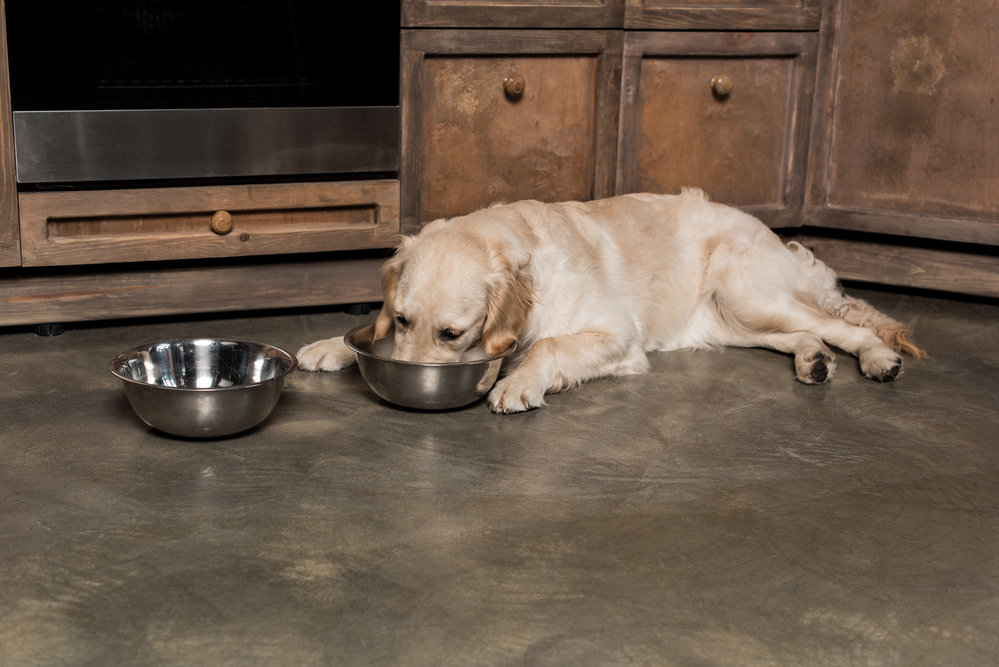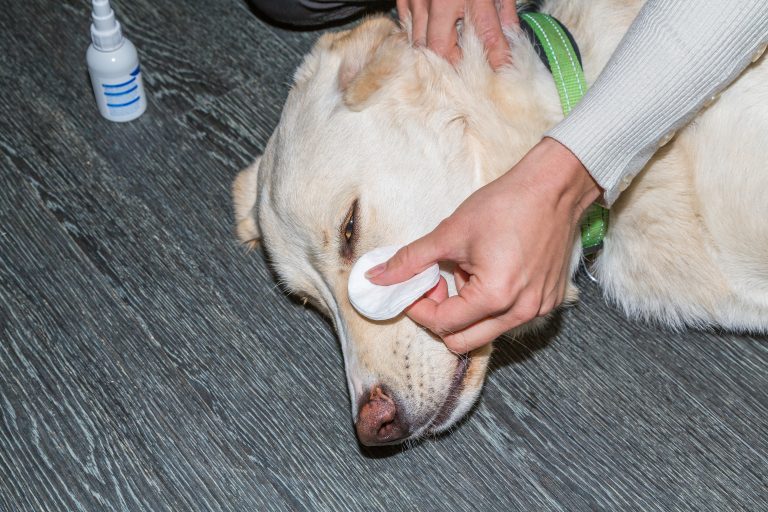Is Vinegar Bad For Dogs?
Vinegar has been known to be a kitchen staple even since 3000 B.C. It has been widely used as a condiment and preservative for its natural ability to blend well into various dishes and be transported in long travels.
Fast forward to the 21st century, vinegar is still highly regarded by everyone who cooks thanks to its multiple uses and naturally distinct flavor.
Speaking of condiments, we humans commonly share our food with our dogs – so long as they are safe and actually good for dogs. With that in mind, is vinegar bad for dogs? Is it another staple human ingredient to avoid giving dogs or it offers benefits to our canines?
The short answer is yes! Apple cider vinegar in small amounts is safe for dogs. Particularly, 1 teaspoon for small dogs and 1 tablespoon for medium and large dogs is a good ratio to follow. On the other hand, overconsumption of vinegar can lead to gas, itchiness, or diarrhea.
In this article, we tackle the benefits of apple cider vinegar to dogs, as well as situations or instances when vinegar can be actually bad for dogs. Read on to know more about this dynamic souring agent and how you can apply it in various ways for the benefit of your beloved Fido.
8 Benefits of Apple Cider Vinegar To Dogs
The standard white vinegar has an acetic acid level of 4-7% and a water level of 93-96%. It’s known as a cooking essential, gardening aid, cleaning material, and even medical home remedy.
According to Healthline, it offers a fantastic line of health benefits for humans like blood sugar control, weight management, reduced cholesterol, and treatment for physical ailments featuring its antimicrobial properties. But did you know that vinegar is beneficial for dogs, too?
In particular, unfiltered apple cider vinegar has an acidic level of 3.1 to 5, which perfectly lines up with a canine’s skin pH level of 5.5 to 7.2. The difference makes for a healthier gut system, shinier coat, tick-free skin, among others. Let us take a look at more benefits of apple cider vinegar to dogs!
#1: Treats Various Infections
Dogs walk on uneven surfaces all the time, most of which are hard surfaces that could make their paws tired or tender – in some cases, infected. Paw infection is not very common among dogs, but it does not mean skipping preventive steps in order to keep them happy and healthy.
You can combine 1:1 parts water and vinegar as a mixture. Use a clean cloth to wipe their paws every time they come indoors from playing outside. This will not only keep paw infections at bay but will also keep their paws clean and ready for bedtime.
Another commonly infected canine body part you can treat with AVC is the ears. Ear infection among dogs is more common than you think and may cause a serious problem when remained untreated. Apple cider vinegar is a versatile ingredient that you can use to clean your dog’s ears. Essentially, this prevents infection even before it happens and wards off icky parasites.
To use as a solution, mix equal parts of vinegar and distilled water. Use a cotton ball to clean the ears’ surfaces and a clean cloth to wipe off the excess liquid. Never squeeze AVC into the ear canal or get the vinegar on the eyes.
Lastly, AVC can soothe itchy or irritated skin. The natural acid in the vinegar rids dead skin cells and promotes the growth of new skin cells. After performing their usual bath, you can make a solution by mixing 2-3 tablespoons of vinegar into a quarter of water. Use this solution as the last rinse and only towel dry to remove excess water. No need to rinse the AVC with water.
You could also use the same amount of solution to spritz on the coat before brushing to achieve a healthier, shinier coat for your furry pal. Store the mixture in a spray bottle for use next time.
We Recommend: BRAGG Organic Raw Apple Cider Vinegar
BRAGG is your best bet when looking for organic apple cider vinegar. It is accessible, affordable, and authentic. You cannot go wrong with unfiltered, unpasteurized, and unheated vinegar for your canine. After all, there is a reason this is proclaimed as “the Mother of Vinegar!”
Furthermore, BRAGG follows the regulations imposed by the California Organic Foods Act of 1990 and is also Kosher Certified to ensure its hygienic, safe, and orderly production and preparation, from farm to table.
You can sprinkle the BRAGG Organic Raw Apple Cider Vinegar on your dog’s meal or mix it in with their drinking water to help aid in their digestion. Using this particular vinegar as a topical solution is also a great way to beat infections, remove tear stains, and relieve discomfort brought by arthritis or hot spots. Remember to dilute in water prior to consumption or application for safe use!


#2: Relieves Hot Spots
VCA Hospitals defines canine hot spots as “red, inflamed skin lesions,” which could grow in different parts of a dog’s body. However, they are mostly found on the legs, head, and hips. These lesions may contain pus and could be extremely painful, especially when exacerbated with more scratches.
Who could have thought that the solution can be found in your kitchen pantry? Apple cider vinegar can relieve general skin irritation and itchiness by mixing one part of AVC with one part of water. Use a cotton ball to soak in the solution and dab on affected areas. To help fasten the healing process, you can let your dog wear an e-cone, also known as “the cone of shame.”
#3: Removes Dandruff, Ticks
Dandruff is annoying, whether on humans or animals. It could be even more frustrating to wash them off from dogs since the canine body is surrounded by fur all over.
Apple cider vinegar works as a topical application, which can lessen or temporarily remove dandruff. This works well for dog owners who like to opt for DIY remedies before shelling out money on expensive vet prescriptions.
To make the solution, mix 50% water with 50% apple cider vinegar and store it in a spray bottle. Spritz all over the coat after your dog’s regular bath. You may also do the hand-cupped method if you do not have a spray bottle. Remember to avoid pouring it on the face and never let it get in contact with the eyes, nose, and mouth.
Ticks are another pesky parasite to look out for. Fortunately, apple cider vinegar offers a wide range of uses to maintain your dog’s good coat, including being an anti-tick sponge bath. First, bathe your dog as usual and rinse the coat thoroughly. Combine one part water and one part apple cider vinegar in a bucket. Using a sponge, let it absorb the solution and apply it all over the coat. Let air dry only. No need to rinse off with water.
#4: Improves Digestion
The most famous use of apple cider vinegar is to improve one’s digestion. For dogs, it could mean helping deliver the nutrients to the entire body in a balanced fashion. The acidity level of apple cider vinegar brings more benefits than harm to your beloved dog.
Like with other foods, a small amount will not disrupt the digestive organ, in contrast, will keep it strong and immune from gut issues to achieve healthy-looking stool and crystal clear urine.


Speaking of urine, did you know that AVC also promotes urinary health? The acid in the vinegar neutralizes the bacteria in the urinary tract and can help prevent pressing urinary issues from occurring.
Putting apple cider vinegar directly into Fido’s drinking water may be a bit too much for their palate, so instead, you can try adding it in a strongly flavored food to keep them eating their favorite dish while getting all the benefits of apple cider vinegar.
Adding apple cider vinegar into their food can also address your dog’s dental issues. The acid in the vinegar effectively breaks down plaque and removes tartar. In essence, it also rids of bad breath and lingering mouth bacteria. An added teaspoon of ACV into your dog’s food or water can do wonders for your hound’s dental, digestive, and urinary health.
#5: Natural Insect Repellent
Aside from being famous for health and medicine remedies, apple cider vinegar is also effective in warding off insects. Fido can finally say goodbye to those annoying fleas, ticks, and biting flies. It would be most beneficial when spraying all over the body before heading out.
A good ratio is one part apple cider vinegar and one part water. You can also bring the bottle of solution whenever you’re going to have an instant insect repellant right inside your bag.
Aside from shooing pesky insects away, apple cider vinegar generally acts as a bacteria cleaner. Some say it can also heal abrasions and cuts. You can use it as a DIY shampoo by combining an equal amount of shampoo, water, and apple cider vinegar in one container and mixing everything together.
Bathe your dog as is, making sure that the shampoo is lathered well to address skin issues while still minor. Rinse your dog well and dry thoroughly.
We Recommend: Heinz Apple Cider Vinegar
Another clear winner is the Heinz Apple Cider Vinegar. This contains 5% acidity and is made with all-natural ingredients.
Aside from being a great salad dressing or food topper, this apple cider vinegar is suitable for canines that can benefit from the natural goodness of vinegar. You can choose between 32 fl oz and 16 fl oz to keep it as a staple ingredient and also a great DIY remedy for your dog’s ailments.
It always seems to be low in stock, just because dogs and dog owners alike love it so much. So the next time you see the stocks up again, make sure to grab a bottle for you and Fido! With 32 fluid ounces, a little goes a long way for your furry pal. Feel free to share the bottle and enjoy sprinkles of it on your own salad.
#6: Removes Tear Stains
Tears stains are the red or brown marks found under the dog’s eyes. It could be caused by excessive tear production that could stem from various reasons such as ingrown lashes, conjunctivitis, shallow eye sockets, and allergies.
Tear stains are more prone on dogs with short snouts like Shih Tzu, Boston terriers, Pekingese, and pugs, and are highly visible on light-colored or white dogs.
As apple cider vinegar is not safe for facial application, mixing the apple cider vinegar with the drinking water is the best way to lower your dog’s pH level and prevent excessive tear staining.
#7: Cure Mange
There are various ways dogs can suffer from skin infections, one of which is mange. Sarcoptic mange is also known as canine scabies and can be transferred from one dog to another. Its milder counterpart is demodectic mange or Demodex, which is typically harmless and not transmissible to humans and other animals.
Apple cider vinegar is a great home remedy if prescribed topical ointments or soap are not available yet. You can directly apply the undiluted apple cider vinegar to the affected area for fast results.
You can also let your dog sit in a bathing bowl and use the apple cider vinegar as a repetitive rinse. Remember not to rinse off the vinegar with water and simply towel off the excess solution.
#8: Pain Relief for Arthritis
Arthritis occurs when there is an inflammation of the joints caused by joint trauma, joint instability, or abnormal cartilage development. Canine arthritis is common in senior dogs and large breeds. When unaddressed, this could lead to loss of mobility.
It is one major problem dogs and pet owners should not have to go through, hence this inspired us to write an entire blog post dedicated to the best dog food for arthritic canines. Check it out if you haven’t already!
Another great ingredient that relieves arthritis pain is apple cider vinegar. An additional teaspoon or tablespoon per 50 lbs of body weight per dog is already a preventive step from getting arthritis. This can delay the condition, lessen joint pain, and increase flexibility.
To apply, microwave-heat the corresponding amount of apple cider vinegar for your dog and damp on the affected joints.


When Is Vinegar Bad For Dogs?
Above, we’ve seen there are 8 benefits of apple cider vinegar for dogs, does that mean all vinegar is good for dogs? Unfortunately, the answer is no! There are some instances when vinegar can be bad for our furry friends and it’s important that we are aware of these circumstances so as to protect our dogs.
#1: Pre-Existing Kidney Disease
Dogs with diagnosed kidney diseases should also stir clear from apple cider vinegar. Why so? The acidity level of the vinegar could aggravate the condition of their kidneys and cause more problems along the way. As such, an alkaline diet is strongly recommended for dogs with kidney issues.
#2: Overconsumption
Another easy culprit of vinegar being bad for your dog is when they have too much. Apple cider vinegar may be beneficial for dogs in many ways, but must never be consumed in excess.
Unfiltered apple cider vinegar is known for its strong aroma and flavor. It is even ill-advised for humans to consume it undiluted – it is that powerful!
For instance, combining 1/4 teaspoon of apple cider vinegar in your dog’s drinking water or food should be enough. If you want to determine their consumption by weight, you can give a teaspoon per 50 lbs of their weight.
Giving anything beyond this could lead to serious health problems such as a myriad of gastrointestinal issues. At best, you should stick with the proper ratio given. It is always better to overdilute apple cider vinegar with water than give it extra strong.
#3: Sensitive Stomach
Apple cider vinegar has lots of healing properties as much as it has a generous volume of acid components, which is why it is risky for dogs with sensitive stomach linings to consume them. Even a small amount is not advised.
Otherwise, feel free to let your dog reap the benefits of apple cider vinegar either as a part of their diet or as a topical aid for skin conditions and even dental health.
Verdict: Is Vinegar Bad For Dogs?
Taking all the information we laid out in this article, we would definitely say:
No, vinegar is not bad for dogs. In fact, it is completely safe for dogs to consume apple cider vinegar, especially in the right proportions. A general rule to follow is to serve dogs one teaspoon of apple cider vinegar per 50 lbs of body weight.
Aside from incorporating this rich ingredient into your dog’s diet, it also has multiple uses for Fido’s physical conditions such as dandruff, infections, hot spots, mange, tear stains, and ticks. As a medical ingredient, it can also effectively ward off insects, relieve arthritic pain, and aid in proper digestion.
So the next time you see a bottle of apple cider vinegar in grocery stores, remember its amazing benefits for dogs we shared in this blog post. Perhaps you will be encouraged to purchase a bottle or two just in case!







